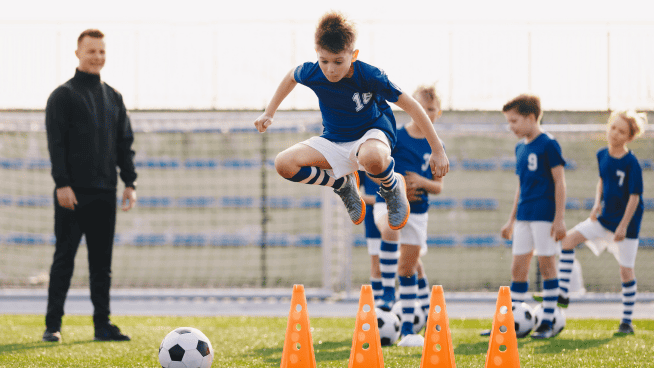If College Coaches Looked at Your Social Media Right Now, What Would They Find?
A few years ago, Scott Fitch, head boys basketball coach at Fairport (New York) High School, learned firsthand how his players could be impacted by poor choices on social media. He has been educating athletes on this topic ever since.
“About five years ago, I had two kids being recruited,” Fitch remembers. “A college coach told me he liked how both of them played, but he was only going to keep recruiting one. He said, ‘Part of our recruiting process is checking out their social media, and the stuff on the other guy’s Twitter page is not what we want at our university.’ That really concerned me.”
In fact, it bothered Fitch so much that he went home that night and read the spurned player’s tweets. “It was brutal,” he says. “Here was a kid I had such a great impression of, and he had this totally different personality online, which was not at all favorable.”
“I had camp the next day with about 100 players, so I stayed up all night and Googled every kid,” continues Fitch. “I went into camp the next day, put a lock on the balls, sat everybody down, and read their social media posts to them. It was one of the most powerful days of camp we ever had.”
From there Fitch began speaking on social media tactics for student-athletes, and he has become respected both locally and regionally for his presentations. Closer to home, he is determined that his own players (and assistant coaches) won’t get tripped up by their social media use.
“After every game, I say, ‘We win together, we lose together, and I want to make sure we’re all smart on social media,’” Fitch explains. “Then, hopefully, they won’t post something while they’re emotional. I don’t know if there is a way to totally protect yourself and the people around you. But I think the more you talk about it, the better your chances.”
He also has advice for his coaching peers when it comes to posting online. To start, Fitch recommends that coaches maintain two social media accounts—a personal one and a public one for coaching-related posts.
On the coaching one, he suggests carefully choosing images and words that tie into one’s philosophy and values. “I feel like my coaching presence and my social media presence enhance each other,” Fitch says. “Coaching, for me, is about more than just basketball. It’s about trying to impact the whole person, and social media is a big part of that in our society.”
But he also cautions coaches to continually be careful. “You can cross a line and not even know it,” Fitch explains. “If there are players or other students who can be identified in the background of a photo of you coaching, and you post that photo, they are now part of how people see your personal world. You want to make sure that everything you share reflects positively on your program and yourself.”
READ MORE:
RECOMMENDED FOR YOU
MOST POPULAR
If College Coaches Looked at Your Social Media Right Now, What Would They Find?
A few years ago, Scott Fitch, head boys basketball coach at Fairport (New York) High School, learned firsthand how his players could be impacted by poor choices on social media. He has been educating athletes on this topic ever since.
“About five years ago, I had two kids being recruited,” Fitch remembers. “A college coach told me he liked how both of them played, but he was only going to keep recruiting one. He said, ‘Part of our recruiting process is checking out their social media, and the stuff on the other guy’s Twitter page is not what we want at our university.’ That really concerned me.”
In fact, it bothered Fitch so much that he went home that night and read the spurned player’s tweets. “It was brutal,” he says. “Here was a kid I had such a great impression of, and he had this totally different personality online, which was not at all favorable.”
“I had camp the next day with about 100 players, so I stayed up all night and Googled every kid,” continues Fitch. “I went into camp the next day, put a lock on the balls, sat everybody down, and read their social media posts to them. It was one of the most powerful days of camp we ever had.”
From there Fitch began speaking on social media tactics for student-athletes, and he has become respected both locally and regionally for his presentations. Closer to home, he is determined that his own players (and assistant coaches) won’t get tripped up by their social media use.
“After every game, I say, ‘We win together, we lose together, and I want to make sure we’re all smart on social media,’” Fitch explains. “Then, hopefully, they won’t post something while they’re emotional. I don’t know if there is a way to totally protect yourself and the people around you. But I think the more you talk about it, the better your chances.”
He also has advice for his coaching peers when it comes to posting online. To start, Fitch recommends that coaches maintain two social media accounts—a personal one and a public one for coaching-related posts.
On the coaching one, he suggests carefully choosing images and words that tie into one’s philosophy and values. “I feel like my coaching presence and my social media presence enhance each other,” Fitch says. “Coaching, for me, is about more than just basketball. It’s about trying to impact the whole person, and social media is a big part of that in our society.”
But he also cautions coaches to continually be careful. “You can cross a line and not even know it,” Fitch explains. “If there are players or other students who can be identified in the background of a photo of you coaching, and you post that photo, they are now part of how people see your personal world. You want to make sure that everything you share reflects positively on your program and yourself.”
READ MORE:
RECOMMENDED FOR YOU
Create A Free Recruiting Profile Today!
CaptainU helps athletes & parents not only be proactive but also to manage and take control of their entire recruiting journey.











